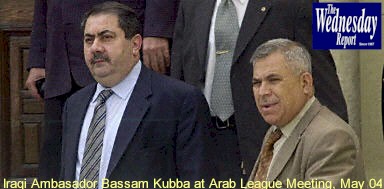

Volume 18, Number 23, June 2, 2004
Comment:
Iraq Soverignty handover less than 30 days away.
United States' President Bush today refused to back down to terrorists, despite continued violence in Iraq just 28 days before the handover of power to an interim government.
The United States and its allies would continue to "take the fight to the enemy," Bush vowed in his commencement address to the Air Force Academy's 2004 graduating class in Colorado Springs, Colo.
"I'm confident of our cause in Iraq," the president said, noting U.S. service members deployed in Iraq, Afghanistan, and elsewhere around the globe are "dealing with killers who have made the death of Americans the calling of their lives."
Yet, he emphasized, achieving success against terrorists in Iraq wouldn't end the war against terror.
"Overcoming terrorism and bringing greater freedom to the nations of the Middle East is the work of decades," Bush pointed out.
He compared today's struggle against global terrorism to the conflict between the world's democracies and totalitarian regimes in Germany and Japan during World War II.
To pull out of Iraq, Bush explained to the graduating Air Force cadets, would be tantamount to waving a white flag to terrorists worldwide.
"The terrorist movement feeds on the appearance of inevitability," he noted. "It claims to rise on the currents of history, using past America withdrawals from Somalia and Beirut to sustain this myth and to gain new followers." The president was referring to past U.S. actions in pulling out its troops from Lebanon after the 1983 terror bombing in Beirut, and later when it departed Somalia in 1993 after the "Black Hawk Down" firefight with radicals in Mogadishu.
America "will need perseverance" to defeat global terrorism, Bush observed, noting, "this conflict will take many turns, with setbacks on the course to victory."
Yet, U.S. confidence in ultimate victory over terrorism "comes from one unshakable belief," Bush declared, noting that Americans believe in former President Ronald Reagan's words: "'The future belongs to the free.'"
Bush pointed out the need to stay the course in Iraq, noting that if the United States had lost its resolve in confronting communism during the Cold War, then "there would have been no long twilight struggle -- only a long twilight."
However, the United States and its allies persevered throughout the 40-year- long Cold War, Bush pointed out, and "stayed true to the vision of a democratic Europe." That resolve, he noted, resulted in the fall of the Berlin Wall and "gave all the world a lesson in the power of liberty."
Three years into the war against terrorism America and its allies have faced many challenges, Bush noted, adding, "There are more ahead."
Now is not the time for impatience or "self-defeating pessimism," he maintained.
"These times demand the kind of courage and confidence that Americans have shown before," the president said.
"You are the ones who will defeat the enemies of freedom," Bush told the graduates. "Your country is depending on your courage and your dedication to duty. The eyes of the world are upon you. You leave this place at a historic time, and you enter this struggle ahead with the full confidence of your commander in chief."
USN Exercise Includes 7 Carrier Strike Groups
The United States Department of Defense announced today that this summer, simultaneous deployment of seven aircraft carrier strike groups (CSGs) will demonstrate the ability of the Navy to provide credible combat power across the globe by operating in five theaters with other U.S., allied, and coalition military forces. "Summer Pulse 04" will be the Navy’s first exercise of its new operational construct, the Fleet Response Plan (FRP). FRP is about new ways of operating, training, manning, and maintaining the fleet that results in increased force readiness and the ability to provide significant combat power to the President in response to a national emergency or crisis.
Beginning this week and continuing through August, the Navy will exercise the full range of skills involved in simultaneously deploying and employing carrier strike groups around the world. "Summer Pulse 04" will include scheduled deployments, surge operations, joint and international exercises, and other advanced training and port visits.
Under the FRP construct, the Navy can provide six CSGs in less than 30 days to support contingency operations around the globe, and two more CSGs can be ready in three months to reinforce or rotate with initially responding forces, to continue presence operations in other parts of the world, or to support military action in another crisis. "Summer Pulse 04" will exercise the logistics and shore infrastructure necessary to execute a large scale surge operation, stress the operational concepts in the Navy’s Sea Power 21 strategy, and improve Navy interoperability with numerous allies and coalition partners as well as other U.S. military forces.
The seven aircraft carriers involved in "Summer Pulse 04" will include: the Norfolk-based USS George Washington CSG and the San Diego-based USS John C. Stennis CSG, both currently deployed, and Yokosuka, Japan-based USS Kitty Hawk. The Mayport, Fla.-based USS John F Kennedy CSG will begin a combined and joint exercise early this month, followed by a scheduled overseas deployment. The Norfolk-based USS Harry S. Truman CSG will conduct a scheduled training exercise followed by overseas pulse operations with the Norfolk-based USS Enterprise CSG, beginning early this month. USS Ronald Reagan will conduct operations in the U.S. Northern Command and U.S. Southern Command theaters during the ship’s interfleet transfer from Norfolk, Va., to its Pacific Fleet homeport of San Diego.
The near-simultaneous deployment of seven carrier strike groups provides the Navy and the joint combatant commanders an opportunity to exercise the FRP while maintaining the ability to respond to crises around the globe, enhance regional security and relationships, meet combatant commander requirements including forward presence, and demonstrate a commitment to allies and coalition partners. "Summer Pulse 04" is scheduled to conclude in August.
The True Horror of Abu Ghraib, Iraq
If the rooms within Abu Ghraib could talk, they'd likely recount tales of the unspeakable.
But Salah Znad, a tidy man with piercing brown eyes and a neat dark mustache, can personally recall the horrors of the Baghdad prison, being one of a group of Iraqis who'd lost their right hands there almost a decade ago.
"My misfortune is that I fell into trouble with the Saddam regime," Znad explained through an interpreter during a May 28 interview at the Pentagon.
Znad said he was arrested Aug. 21, 1994, for discussing currency exchange rates over the telephone and spent five months at Abu Ghraib. During his imprisonment in early 1995 Hussein's minions cut off his hand, the Baghdad resident said.
That wasn't all. Znad pointed to his forehead where a faint "x" could still be seen, despite surgery performed to remove it. Saddam's jailors, he explained, had tattooed the symbol -- meant to mark Znad as a criminal -- just above his eyes.
Yet, today brings happier times for the 38-year-old schoolteacher and fellow Abu Ghraib victims Laith Agar, Hassan Al Gearawy, Qasim Kadhim, Basim Al Fadhly, Nazaar Joudi and Al-laa Hassan. Now, all boast new, prosthetic right hands, courtesy of various American benefactors.
The group was flown to Houston in early April to receive new hands and to have the "x" tattoos removed. After recuperation the Iraqis came to Washington and visited wounded U.S. service members at Walter Reed Army Medical Center and also met with President Bush at the White House May 25.
Znad said he is grateful for Saddam's ouster in April 2003 by U.S.-coalition forces. Although bloodshed continues in his country in the post-Saddam era, he noted Iraqis "have hope now."
After losing the 1990-91 Gulf War, Saddam tightened his hold on the Iraqi people, Znad noted. That's why, he observed, the dictator had made an example of him and his fellow prisoners. Most Iraqis, he said, "were frustrated" with Hussein's brutal regime, but felt helpless to confront it.
"We expected his children would take his place if he should die, and their children," Znad remarked, noting that in this way Saddam's regime "would rule for 10,000 years to come."
The former dictator's elaborate palaces located throughout Iraq, Znad pointed out, prove that Hussein believed his family's rule would emulate the dynasties of the ancient pharaohs of Egypt.
Dr. Joseph Agris is a Houston plastic surgeon that had helped during the operations that provided new hands for Znad and the others. He confirmed nine Iraqis had lost their hands in the group that included Znad. One person, he said, died in Abu Ghraib prison soon after the amputation. The other, he noted, refused the offer to receive a new hand.
It's understandable, Agris observed, that some people would become untrusting and apprehensive after being subjugated to Saddam's torture.
"It was psychotic," he declared, noting the Iraqis' severed hands were put in a preservative and then placed into a basket.
"The basket was then delivered to Saddam," the doctor recalled, so that the dictator could be sure his mandate was carried out. Saddam, he noted, also had videotape shot showing the amputations.
"It's not something anyone wants to see," Agris, who saw the videotape, asserted, noting a person wearing a black hood crudely removed the prisoners' hands with a scalpel.
Filmmaker Don North saw the gruesome video when he was in Iraq working in Baghdad last year. North became determined to do something to help the victims.
"I tracked them down, found them, and asked them if I could tell their story," North recalled. Seven of the eight Iraqis agreed to participate, and North's hour-long documentary, titled, 'Remembering Saddam,' was recently completed. The film, he noted, contains footage of the Iraqis' amputations in Abu Ghraib prison.
So far, the former ABC and NBC news war correspondent noted, no media outlets have shown interest in airing the documentary.
North said he's now shooting another video, titled, "Forgetting Saddam," that documents the Iraqis' experiences in Houston and their visit to Washington.
Boeing Selects Collins Unit for 7E7
Boeing [NYSE: BA] has selected Kaiser Electroprecision, a Rockwell Collins company located in Irvine, Calif., to provide the pilot controls for the new super-efficient 7E7 Dreamliner airplane.
The pilot control system includes the wheel, column and rudder pedals located in the flight deck and the associated mechanisms. Pilots use these to control the aircraft in flight and on the ground. Also included is the control stand with the engine thrust controls.
"Pilot control of the airplane is at the heart of our philosophy for creating a safe, efficient global air transportation system. With Rockwell Collins, we have found a partner who understands our requirements and shares our commitment to safety," said 7E7 Senior Vice President Mike Bair.
The 7E7 pilot controls will be very similar in function to the 777 pilot controls, a similarity requested by airlines from around the world.
"This win is especially gratifying for us and a real vote of confidence," said Rockwell Collins Commercial Systems Executive Vice President and Chief Operating Officer Bob Chiusano. "Boeing's selection of Rockwell Collins to develop and produce these components speaks to our abilities as a systems integrator and our leadership in pilot controls."
Publisher and Editor In Chief:
Micheal John O'Brien
The Wednesday Report is published and printed weekly in hard copy by MPRM Group
Limited
Telephone: {905} xxx-xxxx use email contact